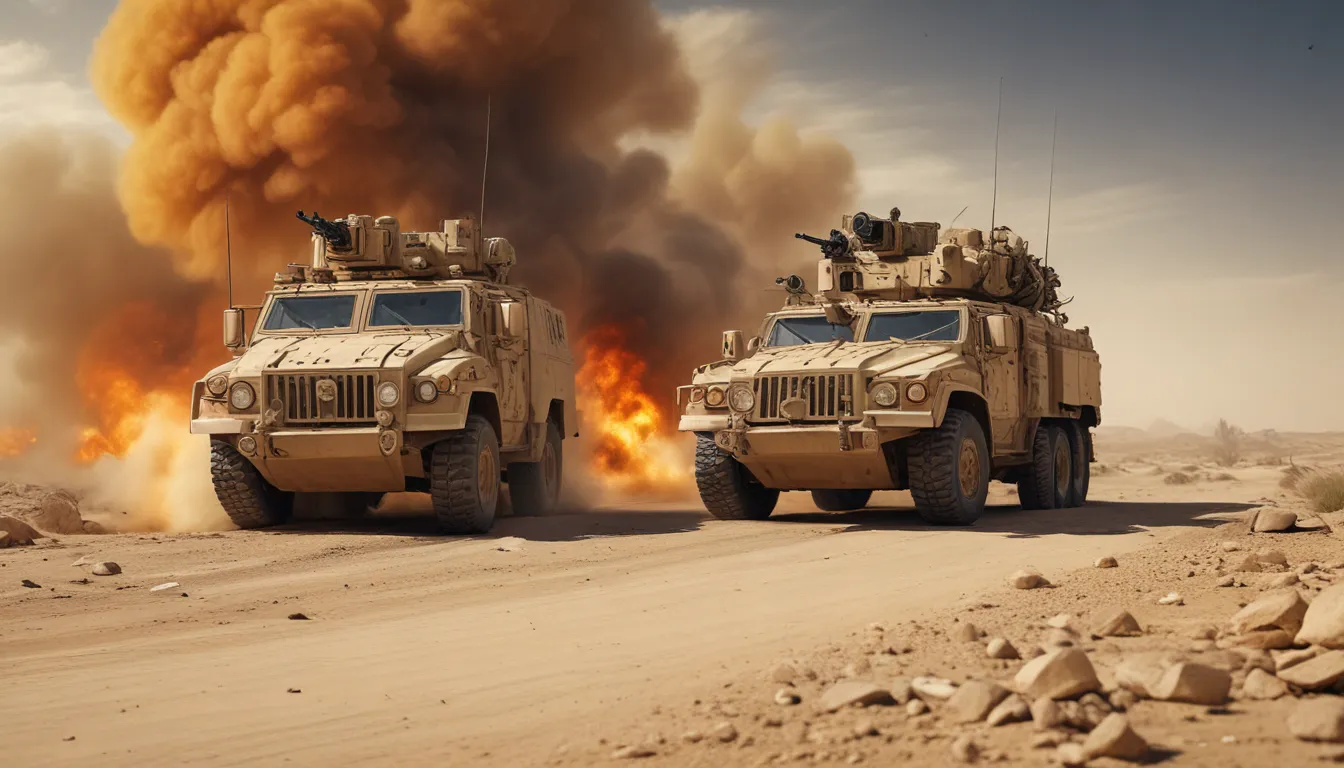The images in our articles may not match the content exactly. They are used to grab your attention, not to show the exact details in the text. The images complement the text but do not replace it.
In the realm of modern history, the Iraq War stands as a pivotal moment characterized by conflict, political decisions, and global reverberations. Spanning from 2003 to 2011, this military campaign, spearheaded by the United States and its partners, aimed to dismantle the regime of Saddam Hussein on the grounds of alleged possession of weapons of mass destruction. Despite the contentious nature of its origins, the war left an enduring impact on Iraq’s infrastructure, society, and the broader Middle East. Join us as we delve into 25 key facts about the Iraq War, illuminating its causes, significant events, and lasting aftermath. These insights aim to provide a comprehensive view of a conflict that reshaped international dynamics and left a profound imprint on the global stage.
Unpacking the Genesis of the Iraq War
The Iraq War, known as the Second Gulf War, was set into motion by the United States in collaboration with coalition forces from allied nations. In March 2003, this military operation was launched with the primary rationale of Iraq’s alleged possession of weapons of mass destruction (WMDs) and purported ties to terrorist organizations, notably Al-Qaeda. However, despite exhaustive efforts, substantial evidence of WMDs was not uncovered, sparking widespread controversy and scrutiny of the war’s justification.
- Timeline: The Iraq War commenced on March 20, 2003, with coalition forces led by the United States initiating the invasion.
- Causative Factor: The primary motive behind the invasion stemmed from the accusation of Iraq harboring weapons of mass destruction and its alleged connections to terrorism.
Pivotal Events During the Iraq War
Throughout the course of the Iraq War, several critical events unfolded that shaped its trajectory and outcomes. One of the most momentous occurrences was the seizure of Baghdad, Iraq’s capital, by coalition forces in April 2003, culminating in the overthrow of Saddam Hussein’s regime. Another significant juncture was the capture of Saddam Hussein himself in December 2003, heralded as a triumph for the coalition forces.
- Capture of Baghdad: In April 2003, coalition forces captured Baghdad, heralding the end of Saddam Hussein’s rule.
- Capture of Saddam Hussein: On December 13, 2003, Saddam Hussein was apprehended in a clandestine hideout near his hometown of Tikrit.
Human Toll of the Iraq War
The human toll exacted by the Iraq War was staggering, impacting not only soldiers but also civilians and entire communities. The conflict resulted in the loss of thousands of coalition troops and casualties among Iraqi civilians reaching the hundreds of thousands. Furthermore, the war precipitated substantial displacement, with millions of Iraqis compelled to abandon their homes.
- Military Fatalities: Over 4,400 U.S. military personnel perished during the course of the Iraq War.
- Civilian Casualties: Estimates suggest that up to 200,000 Iraqi civilians may have lost their lives due to the conflict.
- Displacement Crisis: More than 2 million Iraqis were internally displaced, with an additional 2.5 million seeking refuge in neighboring nations.
Ravages on Iraq’s Infrastructure
The Iraq War inflicted devastating blows on the nation’s infrastructure, encompassing historical landmarks, healthcare systems, and essential services like water and electricity. While reconstruction efforts persist, the enduring repercussions of the damage endure, impeding the country’s progress and the welfare of its populace.
- Infrastructure Destruction: Vital components of Iraq’s infrastructure, such as roads, bridges, and power facilities, suffered substantial damage.
- Cultural Heritage: The conflict precipitated the plundering and destruction of numerous archaeological sites, some tracing back to the cradle of civilization.
Culmination with Coalition Forces’ Withdrawal
The official conclusion of the Iraq War transpired with the withdrawal of U.S. troops in December 2011, denoting the termination of nearly a decade of military involvement in Iraq. Nonetheless, the nation continues to grapple with challenges, including political volatility and the emergence of new extremist factions like ISIS.
- U.S. Troop Withdrawal: In December 2011, U.S. troops bid farewell to Iraq, thereby heralding the end of the Iraq War.
- Ongoing Challenges: Despite the cessation of direct military engagement, Iraq confronts enduring hurdles such as political instability and the rise of new security threats like ISIS.
Lingering Legacy and Dispute
The legacy of the Iraq War endures as one of the most contentious conflicts of the early 21st century. The rationale, execution, and repercussions of the war have sparked intense dialogue and censure. Noteworthy in reshaping international relations, the conflict has influenced global strategies concerning military intervention and counterterrorism.
- WMD Controversy: The failure to uncover WMDs in Iraq led to substantial backlash and questioning of the war’s legitimacy.
- International Ramifications: The Iraq War reshaped global dynamics, notably impacting military intervention policies and preemptive strike doctrines.
- Counterterrorism Paradigm: The conflict catalyzed shifts in counterterrorism strategies and policies worldwide, redefining approaches to combating terrorism.
- Financial Burden: The estimated cost of the Iraq War to the United States exceeds $2 trillion, encompassing prolonged veteran care and interest on borrowed funds.
- Intelligence Reevaluation: Post-war, intelligence practices and analysis underwent scrutiny and revision in the U.S. and coalition nations.
- Sectarian Fallout: The aftermath of the conflict engendered heightened sectarian violence within Iraq, complicating the nation’s journey towards stability.
- Middle East Destabilization: The Iraq War played a role in destabilizing the Middle East, influencing its political landscape and fostering extremist elements.
- Veteran Struggles: Veterans grappled with significant issues post-war, encompassing mental health challenges and reintegration into civilian life.
- Role of Private Contractors: The war introduced the use of private military contractors, precipitating ethical deliberations and accountability queries.
- Technological Advancements: Noteworthy developments in military technology and urban warfare strategies surfaced as a result of the Iraq War.
- Anti-War Movement: A global anti-war sentiment burgeoned, with millions worldwide protesting against the invasion and ensuing occupation.
- Societal Transformations: Iraqi society witnessed shifts in gender roles, with women assuming new responsibilities amid the conflict.
- Environmental Repercussions: The environmental impact of the Iraq War was substantial, with military operations and damaged infrastructure contributing to pollution.
- Cultural Loss: The destruction of historical sites and artifacts during the war led to irreparable cultural losses, diminishing human history and heritage.
Reflecting on the Iraq War’s Enduring Impression
Evaluating the Iraq War unravels a multifaceted narrative that reshaped geopolitical terrains, spanning lives, and leaving enduring imprints on Iraqi and international realms. From the war’s inception in 2003 to the withdrawal of combat troops in 2011, its effects reverberate to this day. Embracing these 25 facts offers a panoramic view of the war’s intricacies, spotlighting the human, political, and social dimensions often relegated in textbooks. As we progress, let’s internalize these learnings, underscoring critical thinking and empathy in interpreting global narratives. The Iraq War, marked by controversies and impacts, serves as a poignant reminder of the enduring requisites for dialogue, peace, and conciliation in a world fraught with divisions.
Navigating with Shared Knowledge
Our dedication to disseminating informative and engaging content remains at the core of our mission. Each fact encapsulated on our platform is a collective effort, mirroring insights contributed by genuine users like you, fostering a mosaic of diversified perspectives and data. Upholding the highest standards of accuracy and reliability, our committed editors meticulously vet and authenticate each submission. Embrace our steadfast commitment to quality and authenticity as you explore, discover, and enrich your understanding alongside us.






